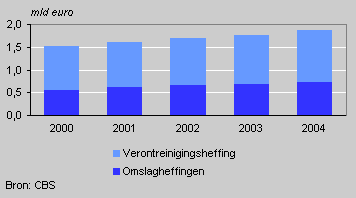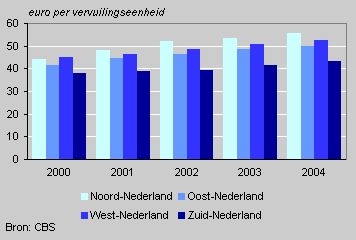Water board taxes to rise substantially in 2004

Dutch water boards expect to receive nearly 1.9 billion euro in taxes in 2004. This is 7 percent more than last year and the largest increase in the last ten years.
Expected revenues from water board taxes, 2004

Head tax up sharply
The expected revenues from the water head tax will be more than 8 percent higher in 2004 than in 2003. The water boards will receive more than 0.7 billion euro for the purposes of dyke maintenance and water management. The increase in head tax revenues is caused mainly by an increase in costs.
Pollution tax
Revenues from pollution tax are expected to rise by just over 6 percent in 2004. Households and businesses will pay a total 1.1 billion euro for clean and pure water.
The increase is mainly caused by an increase in the rate of this tax by an average 4 percent. Households pay an increasing share of pollution taxes (now 71 percent). The share paid by companies has decreased as they have taken more and more measures to reduce the discharge of waste water.
Tax burden highest in the north
The north of the Netherlands has the highest average tax burden with 56 euro per pollution unit. The north and the east of the country show the strongest increases in the period 2000-2004. The construction of large new large water treatment plants and extensive maintenance of installations, pumping stations and high pressure pipelines have pushed up the costs in these parts of the country .
The south of the country is cheapest in this respect (43 euro on average), and the rates have risen by least in this part of the country too. This was because fewer adaptations to existing installations have been necessary and there has been a relatively favourable development in the costs of the treating sewage sludge. Furthermore population density also plays a part in the difference between the rates.
Average rates of pollution tax

Government spends 2.2 billion euro on water quality
In addition to the water boards, municipalities will pay an equally large amount (1.1 billion euro) on sewerage systems. This means the government will pay a total 2.2 billion euro on the collection and purification of waste water; the equivalent of 141 euro per inhabitant.
Number of water boards down again
The number of water boards in the Netherlands has been decreasing for decades. In 2004 it will fall further from 47 to 36. By way of illustration: in 1955 there were around 2,500 water boards in the Netherlands. By 1985 this had already dropped to 255.
Egon Dietz
Source: StatLine (Dutch only)